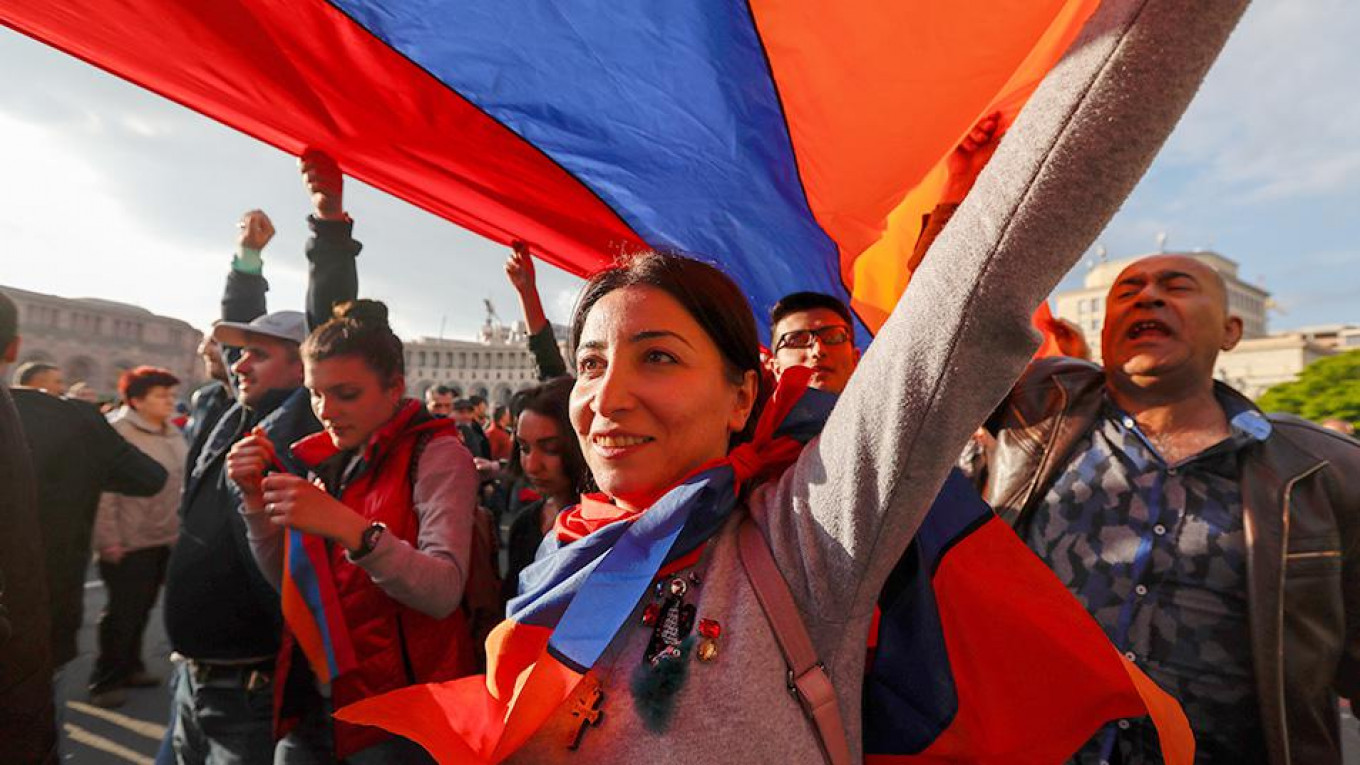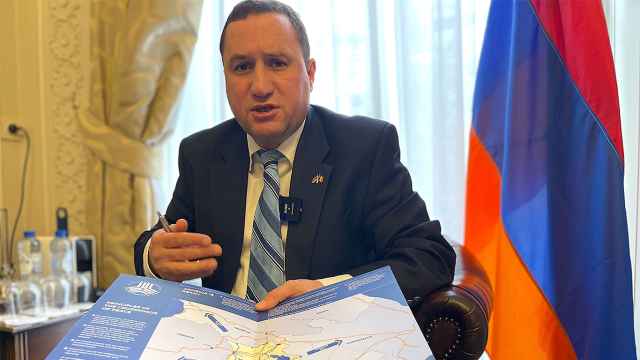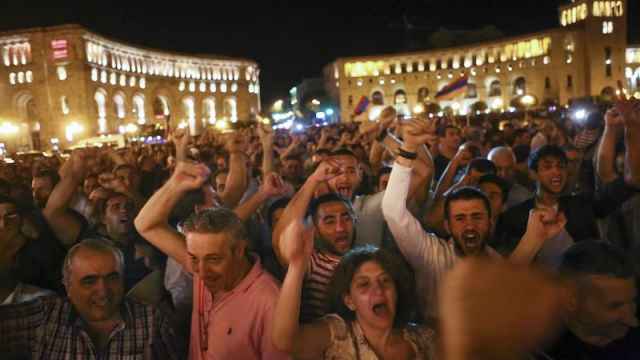Earlier this week, on May 1, the Republican majority in the National Assembly of Armenia voted down Nikol Pashinyan’s candidacy for Prime Minister. A “people’s candidate” supported by three other parliamentary factions, Pashinyan responded by calling a general strike.
The next day, protesters shut down the entire country, including the road to the Zvartnots International Airport. The Republicans caved, announcing that for the next vote on May 8, they wouldn’t nominate their candidate, and would support any candidate with secure one-third of the vote, i.e. Pashinyan.
Enjoying a level of support unprecedented in Armenia’s history, Pashinyan is now on his way to taking the helm of the South Caucasus republic, which has historically been aligned with Russia. And to date, its age-old ally has, at least publically, stayed neutral. Both the Kremlin and Foreign Ministry have stressed that Moscow is not interfering.
Pashinyan is playing along. “I’m confident that Russia, a nation that respects international law, is not interfering with Armenia’s domestic issues. I’m absolutely positive about it,” the protest leader said at a press conference last week.
Although Russia’s state-run media has compared Armenia’s protests to the Maidan revolution that toppled the Kremlin-friendly government in Ukraine in 2013, it has not unleashed its full propaganda force against the protests.
The most biased piece of reporting, which was produced by the Komsomolskaya Pravda newspaper, went out in search of a Western plot. With the United States increasingly disengaged from the region and the U.S. Department of State famously understaffed, this can’t have been an easy task. The only clue the paper was able to dig up was a “chubby lady” in the crowd who didn’t speak Armenian and had quite a negative opinion of Russia.
The emergence of a young, energetic democrat, independent from Russian oligarchs as a future leader of an allied country, however, does present Moscow with a challenge. Unlike the new generation of Ukrainian and Georgian leaders, Pashinyan doesn’t want to pick between Russia and the West. Instead, he is advocating an Armenia-centric approach.
“Pashinyan is very different from the kind of political elites that have so far dominated the Eurasian Economic Union,” Mikayel Zolyan, an analyst with the Yerevan-based Regional Studies Center think tank, told the Moscow Times. “There is a lot of mistrust on the part of Moscow toward Pashinyan and his movement.”
Pashinyan’s record as a parliamentarian won’t necessarily impress the Kremlin either. A notable critic of the previous regime’s decision to join the Eurasian Economic Union, he called it “a threat to national security” and argued it would damage Armenia’s economy.
But the 42-year-old politician has also demonstrated a unique ability to to reinvent himself. Over the last ten days, Pashinyan has given numerous interviews in which he endorsed Armenia’s current stance towards Russia.
“We are not going to make any sharp geopolitical moves,” Pashinyan said to Russian media last week. On Sunday, together with three other Yelk MPs, he met with a delegation of Russian lawmakers visiting Yerevan. “We said that Armenia should continue being a EEU, CSTO member,” he said, referring to the economic and security agreements it has with Russia.
The ties that bind
Opinions vary on just how deep Russia’s ties with Armenia go. Some have called the South Caucasus republic a client state of Russia, citing Yerevan’s binding military and trade agreements with Moscow and the presence of the 102nd Russian military base in Gyumri. (It’s worth noting too that the two countries have a joint air defense system, and that Russia’s Federal Security Service guards Armenia’s border with Turkey.)
Others point to the recently signed partnership agreement with the European Union and argue that Armenia has an increasingly diversified geopolitical stance. With Moscow and Yerevan rarely making their relationship public, it’s hard to assess what the real level of coordination is between the two.
In return, Armenia has backed Russia in its confrontation with the West. It has supported Moscow in its diplomatic scandal over the poisoning of former Russian spy Sergei Skripal in Britian and voted against a UN resolution condemning the annexation of Crimea.
So far, however, those attempting to pull the Moscow card in Yerevan have not met with success.
Throughout last week, Karen Karapetyan, Armenia’s acting Prime Minister, a former Gazprom executive with business interests in Russia, publicized his phone conversations with Russian President Vladimir Putin and Dmitry Medvedev.
“Karapetyan was always seen as Russia’s guy in the region and in the country,” Paul Stronski, a senior fellow in Carnegie’s Russia and Eurasia Program, told the Moscow Times. But with little support from his Republican party of Armenia, Karapetyan lost his bid. His party didn’t nominate him for the Prime Minister’s office last week.
“I think that Pashinyan’s and other opposition leaders’ promises have been heard,” said Stronski. “Moscow is watching closely and playing long term."
Moscow’s initial stoic reaction to Armenia’s “Velvet Revolution” might have been based on the calculation that Karapetyan would just slide into PM’s office, Zolyan of the Regional Studies Center said. But when Armenians rallied behind the opposition leader, Russia decided not to reconsider its neutrality.
“Moscow is not ready to intervene in order to prevent Pashinyan from gaining power,” said Zolyan. “[The Kremlin] understands that the risks of intervening in Armenia are much higher than the risks of staying neutral and taking a ‘wait-and-see’ approach.”
Even the former government’s pro-Russian orientation was mostly out of necessity, says Areg Galstyan, a Yerevan-based political scientist. “It’s hard to find a genuine pro-Russian politician in Armenia.”
Given his comments this week, however, Pashinyan appears ready to sacrifice his skepticism towards Russia for the sake of fulfilling the promise of his revolution. But even that, however, doesn’t rule out uncertainty for Russia.
If the opposition leader succeeds in making Armenia’s elections free and fair, as he now promises, we might see new challenges for the long-standing alliance with Russia.
The Founding Parliament, a radical political force that wants Armenia to break away from Russia, could get a second wind, after being barred during Serzh Sargsyan’s rule. In July 2016, a few of its members calling themselves Sasna Tsrer, or the Daredevils of Sassoun, seized a police station and killed two police officers.
At a rally last Wednesday on Yerevan’s Republic Square, a crowd suddenly started chanting "Sasna Tsrer! Sasna Tsrer!” and a placard saying “We shouldn’t forget our heroes. Sasna Tsrer shouldn’t be political prisoners” appeared on the square.
One of the first things on the Founding Parliament’s agenda, should they be allowed into the political mainstream, will be “Armexit.” The term coined by the organization’s Vice President Varujan Avetisyan stands for Armenia’s “decolonization from Russia.”
“To create a sovereign national state we must first liberate our country from the Russian colonialism,” wrote Avetisyan last December. Should the group enter parliament, it’s unclear how the Kremlin might react.
But for now, Moscow isn’t worried, says Galstyan. The real diversification of Armenia’s foreign policy could only come with “a process of building new strategic alternatives,” said Galstyan. “Unfortunately, there aren’t enough resources or people to take over this process. That’s why we shouldn’t expect a significant change.”
Even Pashinyan’s quick pivot towards Armenia’s traditional alliance with Russia might be explained, not only as a political move, but rather a shift from an opposition platform to government mindset, Stronski said. “It’s one thing to be in the opposition and another to govern,” he said.
Grigor Atanesian is a political commentator and journalist covering Armenia. He is a Fulbright scholar at The Missouri School of Journalism and a former Esquire Russia editor. The views and opinions expressed in opinion pieces do not necessarily reflect the position of The Moscow Times.
A Message from The Moscow Times:
Dear readers,
We are facing unprecedented challenges. Russia's Prosecutor General's Office has designated The Moscow Times as an "undesirable" organization, criminalizing our work and putting our staff at risk of prosecution. This follows our earlier unjust labeling as a "foreign agent."
These actions are direct attempts to silence independent journalism in Russia. The authorities claim our work "discredits the decisions of the Russian leadership." We see things differently: we strive to provide accurate, unbiased reporting on Russia.
We, the journalists of The Moscow Times, refuse to be silenced. But to continue our work, we need your help.
Your support, no matter how small, makes a world of difference. If you can, please support us monthly starting from just $2. It's quick to set up, and every contribution makes a significant impact.
By supporting The Moscow Times, you're defending open, independent journalism in the face of repression. Thank you for standing with us.
Remind me later.








